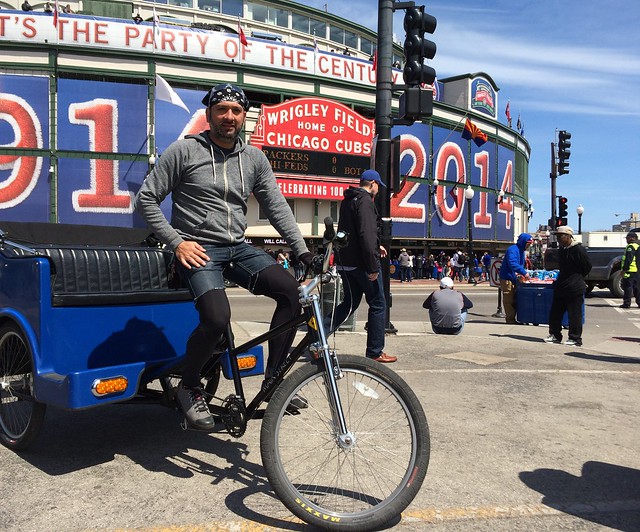Members of the recently formed Chicago Pedicab Association say they can live with various rules and fees imposed under a proposed ordinance to regulate the city’s burgeoning pedicab industry. However, they maintain that the ordinance’s restrictions on where and when they can work downtown would drive them out of business.
In May of 2013, 44th Ward Alderman Tom Tunney introduced the ordinance regulating the licensing and operations of pedicabs to City Council, arguing that such legislation was long overdue. Tunney’s Lakeview district includes Wrigley Field, a popular place for pedicab operators to pick up customers.
After discussion of the ordinance with other aldermen, city departments and members of the pedicab industry over the last year, the legislation is finally moving forward. A joint hearing by the Committee on License and Consumer Protection and the Committee on Transportation and Public Way will take place next Tuesday, April 29, at 12:30 p.m. in the City Council chambers. The full council may vote on the ordinance that Wednesday at its 10:00 a.m. meeting.
“While pedicabs are a unique and green transportation option for residents and visitors to our city, they remain one of the few business activities not licensed under city code,” Tunney said in a statement. “While many pedicabbers are good, safe operators, we need to ensure proper licensing, consumer protection and public safety.”
The ordinance would require operators to obtain a license, at a cost of $250 a year, plus a $25 decal for their vehicles, which would have to meet safety standards, including being equipped with seatbelts. Pedicabbers would need to carry liability insurance and post their fare structure on their vehicle, instead of negotiating the price before or after a ride. The number of operators in the city would be capped at 200.
The dealbreaker for the pedicab association members is a provision banning them from operating during rush hours in the Loop, defined by the river, the lake and Congress, or from riding at any time on State or Michigan, between Congress and Oak. In his statement, Tunney says that the ordinance will help “improve the flow of safe traffic on our congested streets.”
CPA board member Antonio Bustamante argues that pedicabs don’t contribute to the problem of traffic jams downtown, and at ballgames and festivals. “There’s congestion to begin with,” he said. “We’re able to get in and out of congestion much easier because we fit between the traffic lane and parked cars, and we can get around stopped cars. We’re definitely part of the solution.”
Although Bustamante says pedicabbers can make good money working at special events like Cubs and Blackhawks games, he says the downtown tourist districts are their bread and butter. Numerous tourist attractions are located on State and Michigan, and he argues it’s virtually impossible to navigate the downtown grid without using these streets, since they’re the main two-way, north-south thoroughfares.
City officials have suggested pedicab operators use Columbus as an alternative to Michigan. However, Bustamante said accessing Columbus from the west requires pedaling up bridges over railroad tracks, tough work with a loaded vehicle, and the street is often closed to traffic for festivals, parades, and sports events. He noted that, while the ordinance is intended to level the playing field between pedicabbers and taxi drivers, there are no geographic or time restrictions on cabbies.
“If they’re going to pass the ordinance, at least remove the section about rush hours, and State and Madison,” Bustamante said. “I don’t have a big problem with the rest of it.” Tunney’s chief of staff Bennett Larson didn’t respond to my email asking whether the alderman would consider removing the downtown restrictions from the ordinance.
Bustamante owns two pedicabs, leasing the second one to another rider, and calls his business Kickback Pedicab. “I’m a safe operator, I already carry insurance, and I always tell my passengers what the fare will be in advance,” he said. He added that the 200-rider cap shouldn’t be a problem, since he guessed the new fees and restrictions will cause about a third of current operators to look for other work.
If the CPA can succeed in preventing the ban on downtown operations, Bustamente says he looks forward to continuing to work in the industry. “I spent 24 years working in luxury retail, and I enjoy the communication and salesmanship aspect,” he said. “It’s hard, honest work, and you get to spend time outside and be your own boss. It’s an opportunity to show people the city, and I get to be a tourist myself.”




